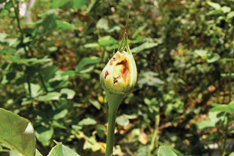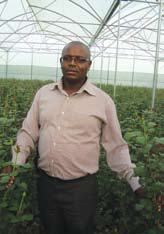REGIONAL BRIEFS Kenya Airways prepare for direct flight to us Kenya’s fresh produce growers have something to smile of. Kenyan airways are expected to start
Category: Past Featured Articles
‘I love you’, ‘I care for you’, or simply—’you are a great friend’. Valentine’s Day is the perfect occasion to show your partner, family or
The Right Product at the Right Time Elgon Kenya Limited, Kenya’s leading one stop supplier of agro-inputs, has launched Zeba, a revolutionary starch-based, super absorbent.
Peat moss is partially decomposed sphagnum moss plants, which are harvested from peat bogs. While peat moss is brown, like soil, it has a different
After climbing one great hill, one only realizes that there are many more mountains to climb’. This old adage attributed to one of African greats rings true in pest management. The past few decades has seen the rise and spread of thrips in greenhouse farming, hitherto a minor pest, to become the most destructive insect pests of the greenhouses. Thrips hits growers where it hurts most! Writes Simon Kihungu
 Thrips are minute, slender insects, usually only a few millimetres long with piercingsucking- mouthparts and the ability to cause direct damage to flowers making it unmarketable for export.
Thrips are minute, slender insects, usually only a few millimetres long with piercingsucking- mouthparts and the ability to cause direct damage to flowers making it unmarketable for export.
Thrips have piercing-sucking mouthparts. They use a needle-like structure to puncture plant tissue and a second tube-like structure which is placed into the hole through which plant sap is extracted, subsequently causing direct damage to the crop.
In Flowers there are mainly two types of Thrip species that attack roses, carnations and other flowers. The western flower thrips (Franklieniela occidentalis) and Thrips tabaci also known as Onion thrip. These thrips species mainly feed on both leaves and flower petals with the majority of their damage to roses occurring throughout the growing period of the flowers.
Why Buyers Should Flock Nakuru  You might think of Nakuru as an ultimate “Cereal region” by victim of being the Kenya’s biggest producer of barley and wheat, but over the past one decade it has become famous for a rather more fragrant crop.
You might think of Nakuru as an ultimate “Cereal region” by victim of being the Kenya’s biggest producer of barley and wheat, but over the past one decade it has become famous for a rather more fragrant crop.
Nakuru is the country’s secondlargest exporter of cut flowers, 80 per cent of which are roses. It is an industry that employed about 35,000 people and generated about 25% of flower business last year. According to generated stories, Nakuru’s success comes down to its latitude: only on the equator, so the story goes, do roses grow perfectly straight. But, attractive though it sounds, this is a myth, according to researchers. “Nakuru is a great place to cultivate roses, but they are no straighter,” says Mr. Andrew Wambua, General Manager, Molo River Farm. “The real advantage is that you get natural light all year round, so you can grow anytime and don’t have to use a lot of artificial illumination.”
“Bringing Colour to the Lives of Children and Communities”
Dutch Flower Foundation supports Local projects in Africa
 The 30 Dutch Flower Group companies operate worldwide, including in Kenya, Zimbabwe, Ethiopia and Uganda. This globally operating horticulture concern from the Netherlands is keen to put something back in the local communities in areas where they operate. When Dutch Flower Group was established in 1999, the management board immediately set up its own foundation, through which Dutch Flower Group supports a range of local projects, including in Africa. “The establishment of Dutch Flower Foundation ensured that from the start in 1999 we were able to support projects financially,” according to Dutch Flower Foundation’s chairman Boudewijn Rip. “We do this mainly in areas where the growers we work with are situated. We also support projects in areas where Dutch Flower Group companies are situated and in regions where our employees live.”
The 30 Dutch Flower Group companies operate worldwide, including in Kenya, Zimbabwe, Ethiopia and Uganda. This globally operating horticulture concern from the Netherlands is keen to put something back in the local communities in areas where they operate. When Dutch Flower Group was established in 1999, the management board immediately set up its own foundation, through which Dutch Flower Group supports a range of local projects, including in Africa. “The establishment of Dutch Flower Foundation ensured that from the start in 1999 we were able to support projects financially,” according to Dutch Flower Foundation’s chairman Boudewijn Rip. “We do this mainly in areas where the growers we work with are situated. We also support projects in areas where Dutch Flower Group companies are situated and in regions where our employees live.”
By Wycliffe N. Sovari
Technically speaking, “power” is the ability to do work ……it all started with the invention of the bulb, we had the telephone by Alexander Graham Bell (18th CENTURY) and since time immemorial; Electronics and Electricity are part and parcel of man’s life all over the globe. Engineering, technology, innovation, applied science and agriculture are thus interdependent and inseparable in our normal day-to-day activities.

Narrowing down to Power as a utility in farming and for that case electricity we really need to check on the merits and demerits as farmers and see how best and cheaply we can utilize power?
In our discussion we shall compare and advice the now; “Power-conscious farmer” on HEP (Hydro-Electric Power), Solar Power, Geothermal, Biogas Power and a little hint on rarely discussed sources such as Nuclear power. Nevertheless, our concentration will feature mostly on natural and renewable sources of energy because of their natural abundance and economics of operation.
In my line of work I visit hundreds of flower farms a year; the flourishing, the ticking over, and the ones in dire straits. A lot of my hard work is dealing with farms that suddenly run into problems. “Ruth, please come and visit our farm as soon as possible, our production has suddenly dropped to half” is a common call writes Ruth Vaughan, Technical Director, CropNuts

My advice to flower farmers on the critical issues in plant nutrition in floriculture would be as follows:-
Start with the basics and know what you are dealing with. A solid ‘risk’ assessment before you even buy the farm is recommended. Dig soil pits to look for soil layers, compaction zones, soil depth, underground water or solid rock. Is the soil type even across the farm? Where does the water go when it rains? Does it hail in this area? What are the day/night temperatures and what is the annual rainfall? Look at the aspect and slope of the farm, will you need special drip lines? Do a complete soil analysis, nematode count, pathology screen and irrigation water analysis. Now you know what you are dealing with and can work out the economics. It’s better to get a shock now than after your investment.
Brexit is still causing a stir in Great- Britain, including among growers, who have been talking a lot about the UK’s upcoming departure from the EU the last couple of months. The structure, distribution channels and staffing needs of a company seem to play an important role in the entrepreneur’s opinion about Brexit.
“I’m really disappointed that the majority of the population voted in favour of leaving the EU”, says Matthew Smith of Brighter Blooms in Preston. “My preference was to stay; operating alone isn’t good for our economy. International business is going to be more complex without a doubt, it’s going to involve more paperwork for example. And we may have to start paying import duties on products from abroad.”
